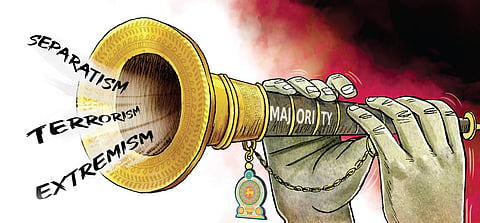

Speaking to the “Sinhala nation” over television and radio channels on 18 November 2020, Sri Lankan President Gotabaya Rajapaksa highlighted the policies and programmes of his government. This significant speech has unfortunately not attracted the attention it deserves from Sri Lanka watchers in India. The President equated the Sri Lankan nation with the majority Sinhalese community.
To quote: “A year ago, 6.9 million voters in this country elected me as your new President. It is no secret that the majority, who voted for me then, were Sinhalese. They rallied because they had legitimate fears that the Sinhala race, our religion, national resources and the heritage would be threatened with destruction in the face of various local and foreign forces and ideologies that support separatism, extremism and terrorism. The main appeal made by the people to me was ‘to protect the country’.”
By equating the nation with the majority community, Gotabaya Rajapaksa has done incalculable harm to the pluralist character and composite culture of Sri Lanka. There are diversities, and there are also linkages. But the Sinhalese and the Tamil chauvinists look at the past through the prism of the present. They project the two communities as being at war with one another for several centuries. Professor Gananath Obeyesekere, a distinguished anthropologist, has exploded the myth of the Aryan/Dravidian divide; he has concluded that if one traces the ancestry of various communities, he would realise that they are all intermixed with South Indian peoples.
The Sinhalese bigots forget that the efflorescence of the Theravada form of Buddhism has much to do with fruitful contacts with Buddhist centres of learning in South India. The greatest epic of Theravada Buddhism is not in the Sinhalese language but in Tamil. Manimekalai is the greatest literary gem of Theravada Buddhism. The Tamil chauvinists also ignore the fact that Buddhism was a flourishing religion in the Tamil areas. Delivering the Vesak Memorial lecture in Chennai a few years ago, Professor Padmanabha pointed out that before Sri Lanka’s European age, a large number of Lankan Tamils were adherents of Buddhism.
The composite culture in Sri Lanka is all too evident. Some communities adhere to the practices of more than one religion. The Hindu Bhakti cult has influenced Buddhism and there are images of Hindu Gods in Buddhist Chaityas. The deity Skanda (Muruga) continues to be a major intersection of several religious faiths. Hindus, Buddhists, Christians and Muslims all go to Kataragama, where the atmosphere is one of tolerance and goodwill. During my last visit, I found Buddhist pilgrims outnumbering the Hindus; they carry the Kavady with intense devotion and fervour.
Despite cultural commonalities, the chauvinists propagate the falsehood of age-old animosities between the two communities. Their tendentious arguments remind me of the famous statement of Voltaire: “If you believe in absurdities, you will commit atrocities.” It is my submission that the ethnic conflict is the product of post-independence politics, especially from 1956, when the Sinhalese ruling class started building the nation based on Sinhala language and Buddhist religion, to the exclusion of minority claims. The consequence was Lanka becoming one of the notorious killing fields of the world where the victims included all communities—Tamils, Sinhalese and Muslims.
Eleven years after the end of the war, ethnic reconciliation still remains a distant dream. And flushed with victory, the President and his brothers have begun equating the nation with the majority community. The lesson is crystal clear. If the political system does not provide for tolerance of multiple identities, tensions and fissures will soon develop. A meaningful solution can be found only if the political system enshrines tolerance, power-sharing, devolution and autonomy. And what is more, in a world of shrinking geographical boundaries and widening intellectual horizons, no man can remain an island; so also, no country can remain isolated.
The international community will definitely wake up and start exerting pressure on Sri Lanka to change its course. Thanks to the genius and wisdom of Mahatma Gandhi and Jawaharlal Nehru, we in India recognise the wisdom of the statement that the greatness of a nation consists in how well it treats its minorities. Unless the ruling elite in neighbouring countries create and nurture a political system where multiple identities can coexist harmoniously, ethnic tensions would continue to bleed our region.
I have visited Sri Lanka many times and given several lectures in different parts of the country. I always mentioned that the greatest embodiment of India’s composite culture was late President A P J Abdul Kalam. A devout Muslim, he grew up in the eclectic environment in Rameshwaram and embodied in himself the noblest qualities of Indian culture. A Muslim steeped in Hindu traditions, a scientist who would recite verses from Thirukkural, a consummate artist who played the Sarasvati Veena, a scholar well versed in Quran, Bhagwat Gita and the Bible—he was a role model for all of us.
Kalam remained a teacher till the very end and had immense faith in the youth of the country. He was convinced that India would become a great and powerful nation. I loved him, respected him, adored him, and during the present “crisis in civilisation” (Tagore’s phrase), I pray for the continuance of his love, service and inspiration.
(The author is Founding Director and Senior Professor (Retd.), Centre for South and Southeast Asian Studies, University of Madras)
V Suryanarayan (suryageeth@gmail.com)
Post-Doctoral Fellow in the Madras Institute of Development Studies